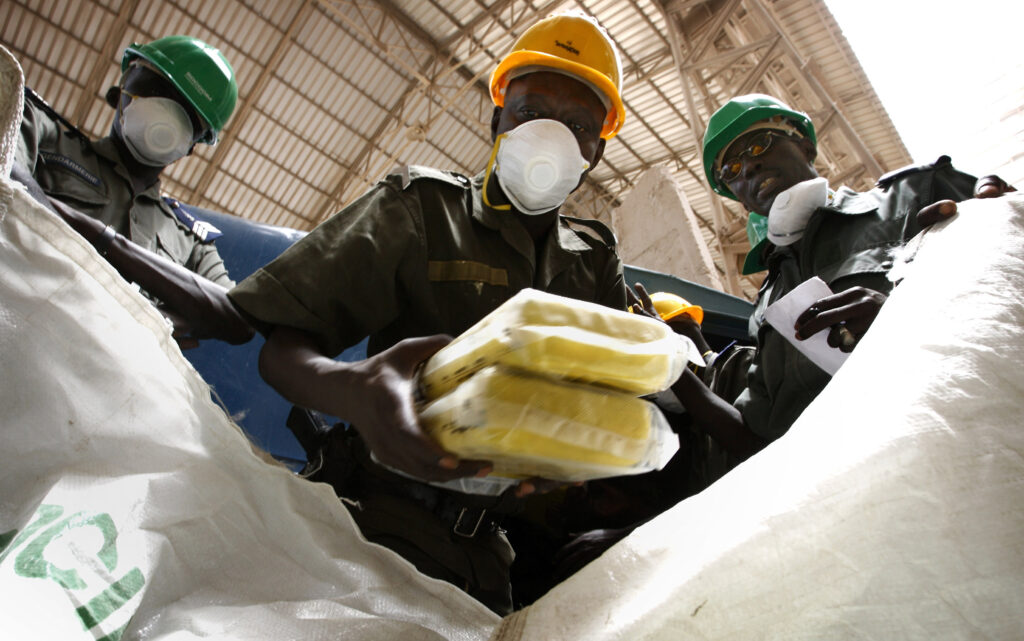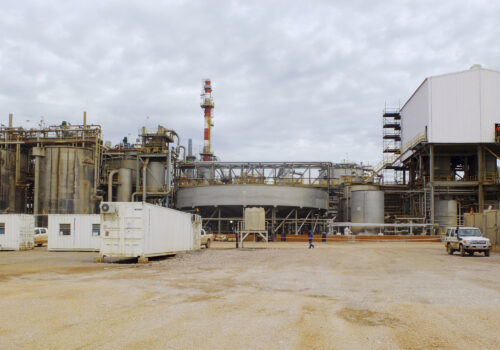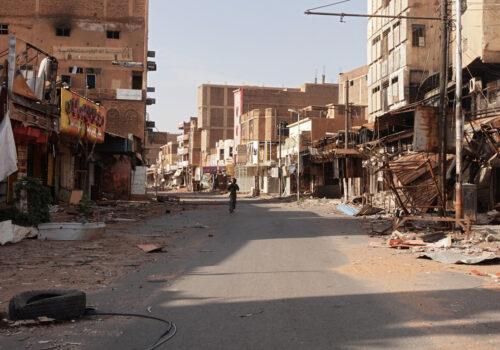When surrounded by crises, it is easy to ignore the one approaching on the horizon. Yet the international community may be overlooking an emerging threat in the Sahel—one that will gravely impact geopolitics in the region and beyond.
It is no difficulty to find crises across the Sahel and its adjacent neighborhoods: Economic stagnation, extreme weather and climate degradation, multiple terrorist organizations and jihadist groups claiming territory, a series of military coups and democratic backsliding, various non-jihadist rebel and separatist alliances, a youth bulge and widespread unemployment, and a genocide all compete for sparse outside attention.
Yet, sailing from distant shores comes yet another crisis: An increase in drug trafficking, with flows originating in the Americas, crossing the Atlantic, and making their way into the markets of Europe.
This influx of drugs will have a marked impact, not only on the region itself, but also on the wider world should the worst happen.
The best-case scenario is merely the introduction of additional groups of well-funded armed criminal enterprises with international connections in an already volatile region. The worst-case scenario is the emergence of narco-terrorism on a scale hitherto unheard of and the entrenchment of partnerships between drug smugglers and increasingly well-funded terrorist groups, armed with cash and boasting access to international connections and smuggling routes.
In short, the worst-case scenario is one in which organizations such as al-Qaeda and the Islamic State of Iraq and al-Sham (ISIS) are fueled and financed by one of the largest drug markets in the world.
A bad situation getting worse
According to the UN Office on Drugs and Crime (UNODC), between 2015 and 2020, an average of thirteen kilograms of cocaine was seized per year in the region. In 2021, the amount seized rose to forty-one kilograms. Then in 2022, it spiked to 1,466 kilograms.
In comparison to 2015 seizures, that is an increase of 11,176 percent.
Before complete data for 2023 became available, the UN cited that 2.3 tons (just over two thousand kilograms) of cocaine had been seized in Mauritania alone between January and June 2023. These statistics are alarming, and they don’t even show the full picture: Amounts seized are not amounts trafficked—that amount is likely far higher.
While domestic drug use is rising across the Sahel, sparking public health crises that are ill-afforded in many countries, the region is becoming a drug trafficking corridor. The drugs are bound for outside markets, with the increase in activity attributed to Europe’s surging demand for illegal narcotics and trafficking groups searching for new routes to markets.
The region is a drug smuggler’s paradise.
Located on the doorstep of Europe and the Middle East, the region is vast and often sparsely populated. It is also riddled with economic deprivation, with an ever-increasing population of youth desperate for opportunity. The countries in the Sahel often have weak governance, widespread corruption, and ongoing battles with insurgents and fundamentalists.
On top of that, Sahelian officials and individuals are vulnerable to the influence of drug gangs—but they are not alone. There are numerous documented cases from across the world of drug gangs using officials to further their work, such as a premier of the British Virgin Islands. Following recent seizures and arrests in the Sahel, the UN expressed concerns about the range of individuals—including the political elite, community leaders, and armed groups—who appear to be involved in facilitating drug trafficking.
While the involvement of key individuals in facilitating drug trafficking is widespread, what makes the situation in the Sahel worrisome are the “armed groups” involved. In Latin America, armed groups facilitating drug trafficking are organizations such as FARC and in Southeast Asia they are militias tied to regional forces or even the drug traffickers themselves. In the Sahel, they are international jihadist organizations, ones with global ambitions and a willingness to export terror and war from their base of operations.
Worrying signs
An array of terrorist organizations operate in the Sahel region: Groups include al-Qaeda affiliate Jama’at Nusrat al-Islam wal Muslimin (JNIM), Islamic State in the Greater Sahara (ISGS), Islamic State in West Africa Province (ISWAP), and Boko Haram.
These groups control vast swaths of land in the Sahel, are expanding and entrenching their control, and are also competing with each other, propelling their searches for more resources. Because of this, they are among the groups that can most stand to financially benefit from the burgeoning drug trade.
While the drug smuggling flows are opaque, the UNODC highlights that the “limited evidence” of violent extremist armed groups involved in drug trafficking “does not mean that such groups are not involved.” These groups, the UNODC adds, are “likely to benefit indirectly” from drug trafficking, explaining that groups such as JNIM and ISGS demand taxes or fees from traffickers in areas where they operate.
Even if these organizations are not directly managing the drug trade, they stand to benefit from the routes and from facilitating drug smugglers’ operations in the territories they control. Such a partnership could be devastating for the region and beyond.
The UNODC notes that information about these groups’ involvement in the drug trade could still emerge. Historically, terrorist and jihadi organizations have embraced a more hands-on approach to the drug trade to fund their organizations and operations. The Taliban in Afghanistan has long been linked to the opium trade (and the drug trade has supported terrorism), ISIS in Syria has produced drugs for market in Europe and smuggles drugs across the Middle East, and Hezbollah has been tied to Columbian drug rings.
With the Sahel becoming an increasingly major drug trafficking corridor, terrorist groups could shift from merely facilitating the drug trade toward actively managing and participating in it, spreading narco-terrorism and expanding the funding for these groups. A war on drugs and narco-terrorism in the Sahel would be a devastating addition to the current war on terror across the region, where 43 percent of global terrorism deaths take place. A development such as this would not only be dangerous for the Sahel, but for the wider Middle East and Europe as well. Drug routes are known to facilitate other forms of international smuggling and for hiding activities from authorities—ever more dangerous when involving jihadist groups.
What the West can do
Unfortunately, the West can’t do much in the Sahel.
Both the United States and the European Union (EU) have retreated from the region, driven away by military juntas that do not share the West’s democratic values and concern for human rights. Various joint military efforts that had been underway to combat terror groups have fallen apart as the United States and EU left the region and lost partners. This is unlikely to change, and if the United States and EU lack the partners necessary to combat jihadist groups in the Sahel, they will likely also lack the ability to combat drug smuggling.
What they can do, however, is support and strengthen partnerships with the costal democracies in West Africa, preventing drugs from entering the Sahel in the first place.
West African democracies are on the frontlines of combating jihadists. Terrorists are attempting to expand operations and territory in countries including Senegal, Benin, Togo, and Ghana. These democracies are also on the frontlines of combating drug smuggling and are making waves with seizures. For example, last November, Senegal’s navy seized three tons of cocaine that was headed towards Europe. In April this year, the country made headlines for seizing 1,140 kilograms of cocaine (the most ever intercepted on land), which was headed toward Mali. More seizures followed in June. In Ghana, authorities have also clamped down on trafficking, making headlines after arresting a duo attempting to smuggle an amount of cocaine worth six million dollars through Accra’s airport and to London. On September 7 in Guinea-Bissau, authorities (with help from the US Drug Enforcement Administration and a European organization called the Maritime Analysis and Operations Centre) seized 2.6 tons of cocaine that had arrived from Latin America.
As drugs continue to flow, and as the domestic use of drugs continues to rise, West African politicians and societies are just as interested in addressing drug trafficking as the United States and EU are. These West African democracies would be willing partners in combating the twin threats of expanding terrorist groups and a burgeoning drug trade.
Should the Sahel become home to narco-terrorism, the consequences would be catastrophic, not only for the Sahel but for the world. The international community must not ignore yet another crisis.
Alexander Tripp is the assistant director for the Atlantic Council’s Africa Center.
Further reading
Wed, Aug 14, 2024
Critical minerals investment must avoid the mistakes of the past in African mining
AfricaSource By Rama Yade, Sibi Nyaoga
By getting mining investment right, the United States can set a new precedent for its collaboration with African countries in other areas, such as health, security, and technology.
Tue, Jul 16, 2024
It’s time to invest in the African creatives shaping global trends
AfricaSource By
African governments, their international partners, and investors can do more to ignite Africa’s creative industries.
Tue, May 28, 2024
Sudan is an abject disaster. Is anyone listening?
AfricaSource By Benjamin Mossberg
US efforts in Sudan are not working. Additional visibility and attention can hopefully bring about solutions.
Image: Senegalese soldiers fill a bag with bricks of seized cocaine to be destroyed in the town of Rufisque, just outside the capital Dakar, August 2, 2007. Senegal burned nearly 2.5 tonnes of cocaine seized in June and worth more than $300 million, the largest haul ever in the West African country, a police official said on Thursday. REUTERS/Finbarr O'Reilly (SENEGAL)



